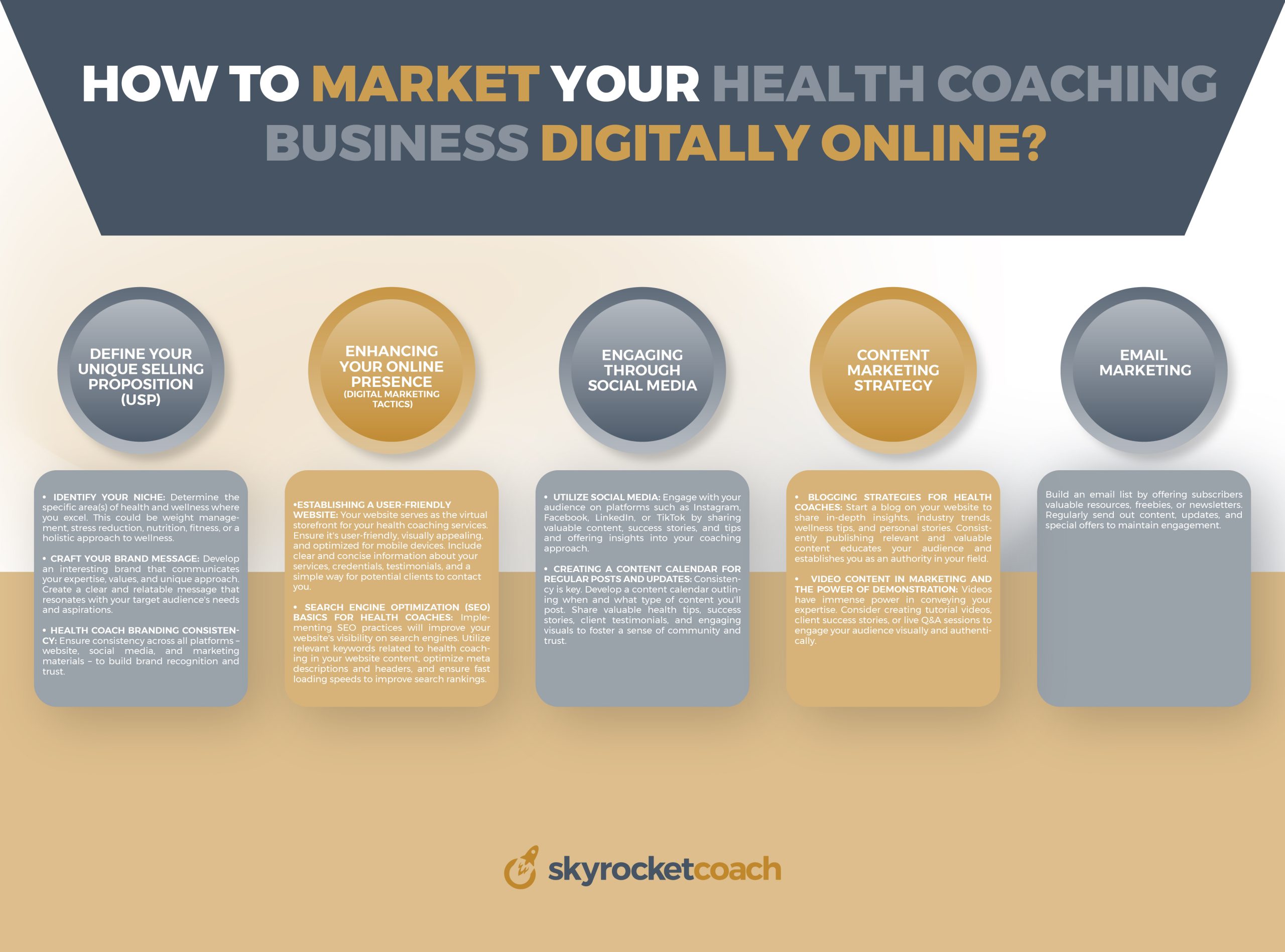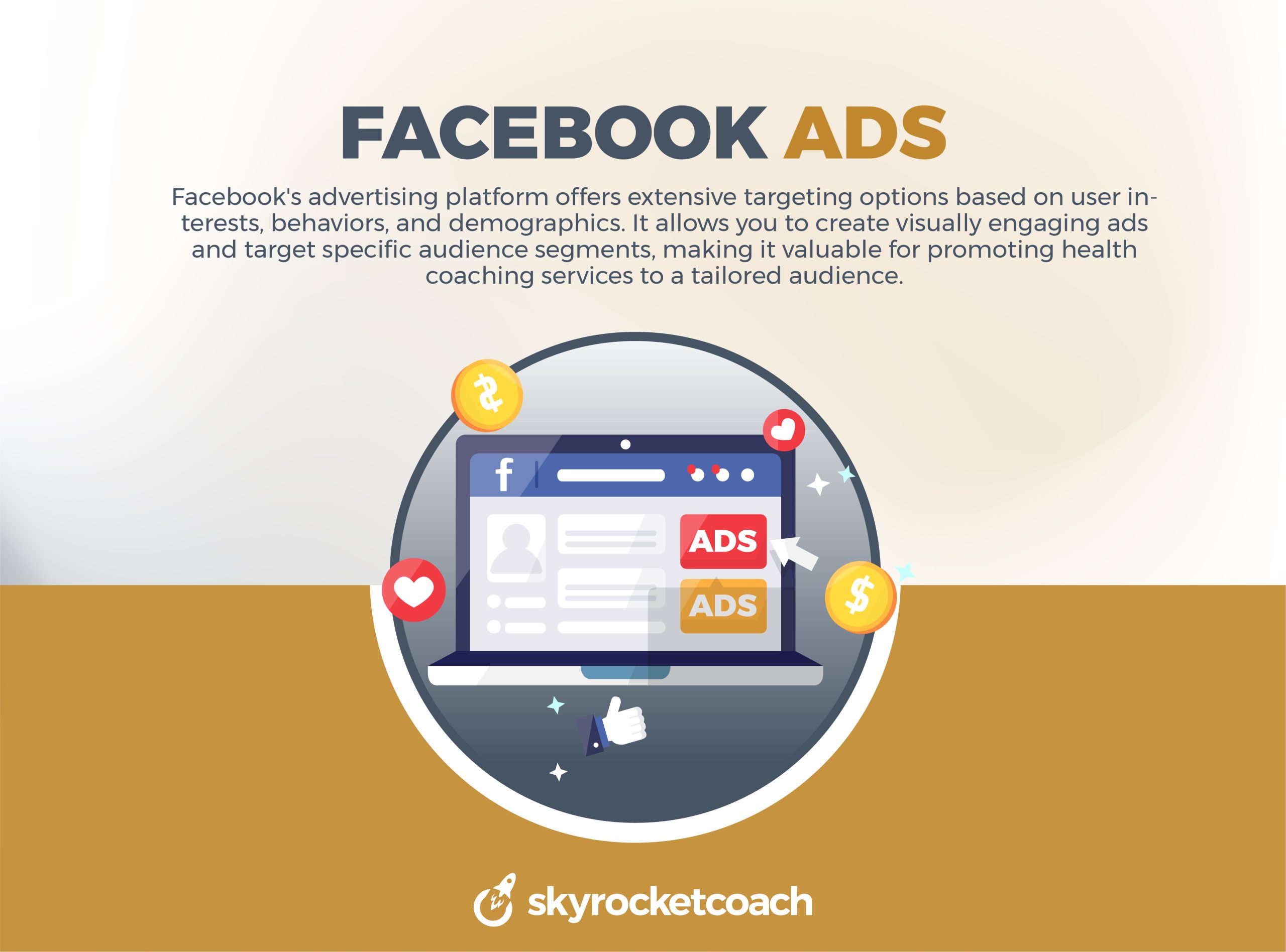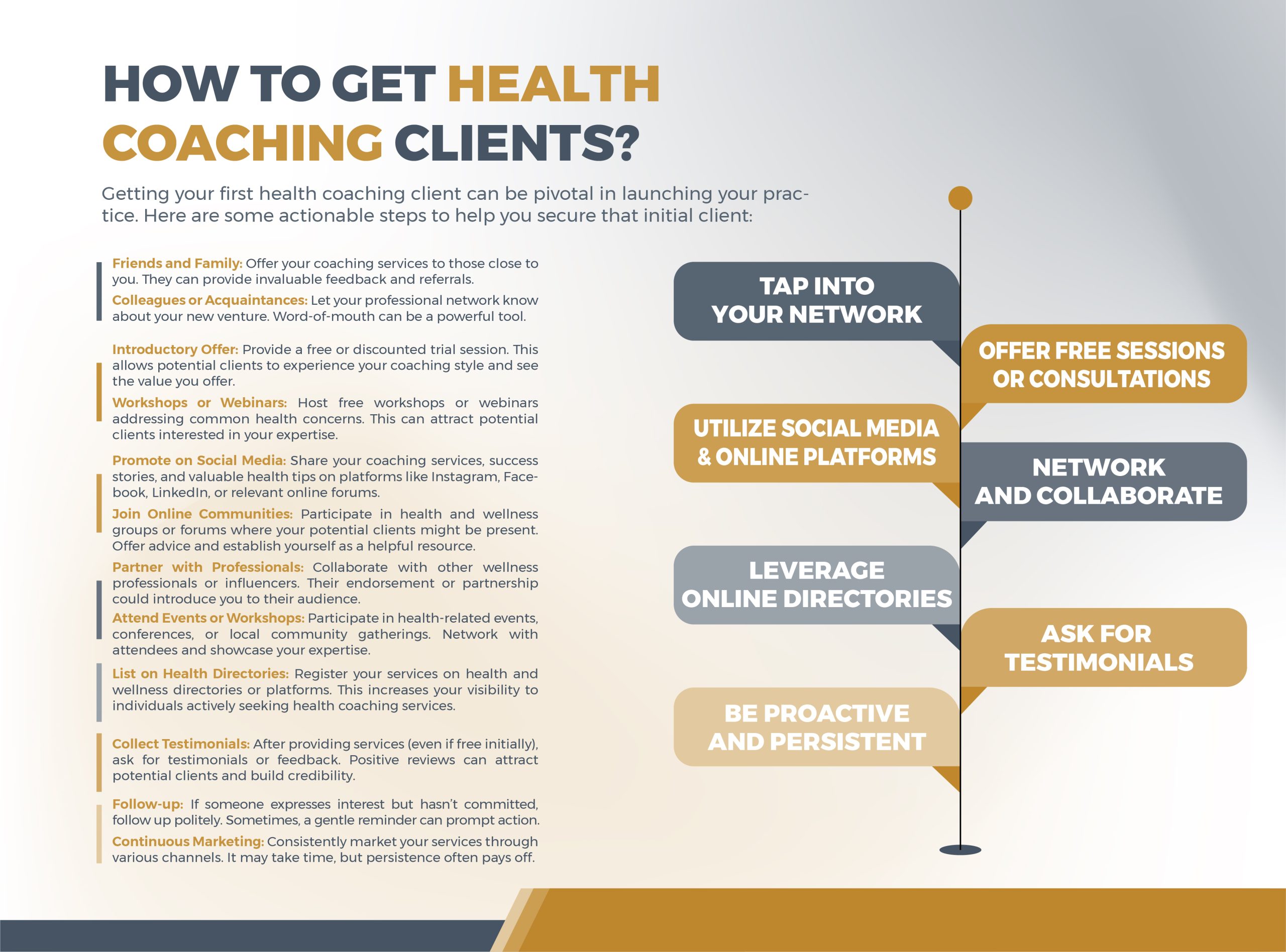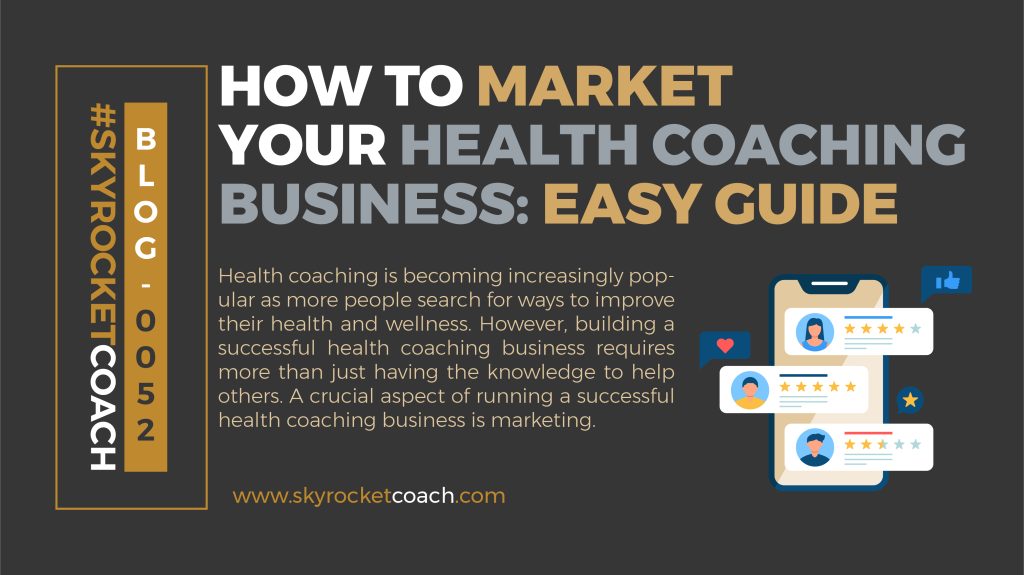Health coaching is becoming increasingly popular as more people search for ways to improve their health and wellness. However, building a successful health coaching business requires more than just having the knowledge to help others. A crucial aspect of running a successful health coaching business is marketing.
Luckily, this article will discuss the importance of marketing for health coaching businesses and the goals of health coaching business marketing.
Let’s get started on how to market your health coaching business effectively.
Table of Contents
The Importance Of Marketing For Health Coaching Business
Without marketing, it can be challenging for health coaching businesses to attract new clients and maintain a steady stream of income. Marketing plans can help health coaches stand out from rivals, get more people to know about their services, and show how health coaching can help people. Utilizing marketing tactics can help health coaches build a brand, attract a loyal following, and make a more significant impact on the health and wellness industry.
The Goals Of Health Coaching Business Marketing
The main goal of health coaching business marketing is to attract and retain clients. Specific objectives of health coaching marketing strategies include:
- Building brand awareness and recognition
- Generating leads and converting them into clients
- Establishing the business as a thought leader in the industry
- Providing valuable content that educates and engages potential and current clients
- Creating and maintaining a positive reputation through word-of-mouth marketing.
How To Market Your Health Coaching Business Digitally Online?

Marketing your health coaching business effectively requires a strategic approach that encompasses several key elements. Here’s a breakdown of essential steps to market your health coaching services successfully:
Define Your Unique Selling Proposition (USP)
- Identify Your Niche: Determine the specific area(s) of health and wellness where you excel. This could be weight management, stress reduction, nutrition, fitness, or a holistic approach to wellness.
- Craft Your Brand Message: Develop an interesting brand that communicates your expertise, values, and unique approach. Create a clear and relatable message that resonates with your target audience’s needs and aspirations.
- Health Coach Branding Consistency: Ensure consistency across all platforms – website, social media, and marketing materials – to build brand recognition and trust.
Enhancing Your Online Presence (Digital Marketing Tactics)
A strong online presence is crucial for any health coaching business looking to reach and engage with its audience effectively. Leveraging various digital marketing strategies can significantly enhance visibility, credibility, and client acquisition. Here are some of the essential tactics:
- Establishing a User-Friendly Website: Your website serves as the virtual storefront for your health coaching services. Ensure it’s user-friendly, visually appealing, and optimized for mobile devices. Include clear and concise information about your services, credentials, testimonials, and a simple way for potential clients to contact you.
- Search Engine Optimization (SEO) Basics for Health Coaches: Implementing SEO practices will improve your website’s visibility on search engines. Utilize relevant keywords related to health coaching in your website content, optimize meta descriptions and headers, and ensure fast loading speeds to improve search rankings.
Engaging Through Social Media
- Utilize Social Media: Engage with your audience on platforms such as Instagram, Facebook, LinkedIn, or TikTok by sharing valuable content, success stories, and tips and offering insights into your coaching approach.
- Creating a Content Calendar for Regular Posts and Updates: Consistency is key. Develop a content calendar outlining when and what type of content you’ll post. Share valuable health tips, success stories, client testimonials, and engaging visuals to foster a sense of community and trust.
Content Marketing Strategy
- Blogging Strategies for Health Coaches: Start a blog on your website to share in-depth insights, industry trends, wellness tips, and personal stories. Consistently publishing relevant and valuable content educates your audience and establishes you as an authority in your field.
- Video Content in Marketing and the Power of Demonstration: Videos have immense power in conveying your expertise. Consider creating tutorial videos, client success stories, or live Q&A sessions to engage your audience visually and authentically.
Email Marketing
Build an email list by offering subscribers valuable resources, freebies, or newsletters. Regularly send out content, updates, and special offers to maintain engagement.
How Do You Market Your Health Coaching Business Locally?
Local And Community Marketing Approaches
Engaging with your local community can be a powerful way to establish your presence and credibility as a health coach. Here are two effective approaches to consider:
- Networking and Partnerships
- Joining Local Business Groups and Health Networks: Participate in local business associations, wellness clubs, or health-related networking groups. Engaging with these communities can provide valuable opportunities to network with like-minded professionals, gain referrals, and showcase your expertise.
- Forming Partnerships with Healthcare Providers and Fitness Centers: Collaborate with local healthcare providers, gyms, or fitness centers to create mutually beneficial partnerships. Offer to provide educational materials, workshops, or one-on-one sessions to their clients, establishing yourself as a trusted resource for health and wellness guidance.
- Workshops and Speaking Engagements
- Conducting Local Workshops and Lectures: Organize and host workshops or seminars on health-related topics within your community. Focus on subjects that resonate with your target audience, such as nutrition, stress management, or fitness. These events can attract potential clients and position you as an authority in the field.
Public Speaking Tips to Promote Your Coaching Services
When speaking at local events or workshops, consider these tips:
- Know Your Audience: Tailor your content to your audience’s specific needs and interests.
- Engage and Educate: Use storytelling, visuals, and interactive elements to engage the audience while providing valuable information.
- Offer Value: Provide actionable tips or insights that attendees can implement in their daily lives.
- Collect Contact Information: Have a sign-up sheet or offer a free resource in exchange for email addresses to continue the conversation beyond the event.
Paid Advertising Strategies
Incorporating paid advertising into your marketing mix can significantly amplify your reach and engagement with potential clients. Understanding various platforms and measuring return on investment (ROI) are pivotal in ensuring your ad spends yield optimal results.
-
Understanding Different Platforms
Comparing Google AdWords, Facebook Ads, and Instagram Sponsorship
- Google AdWords: Google AdWords, now known as Google Ads, is a powerful platform for displaying ads to users actively searching for health-related topics. With precise targeting based on keywords and demographics, you can reach potential clients when they express intent related to your services.
- Facebook Ads: Facebook’s advertising platform offers extensive targeting options based on user interests, behaviors, and demographics. It allows you to create visually engaging ads and target specific audience segments, making it valuable for promoting health coaching services to a tailored audience.

- Instagram Sponsorship: As a part of Facebook’s advertising ecosystem, Instagram provides visually compelling opportunities for promoting your health coaching business. Leveraging engaging visuals and storytelling, Instagram sponsorship can effectively reach a younger demographic interested in wellness and fitness.
-
Measuring Return On Investment (Roi)
Basics of Tracking Ad Performance and Adjusting Strategies Accordingly
- Setting Clear Objectives: Define specific goals for your advertising campaigns: lead generation, website traffic, or direct sales. Clear objectives enable better tracking and evaluation of ad performance.
- Utilizing Analytics Tools: Platforms like Google Ads Manager, Facebook Ads Manager, and Instagram Insights provide detailed analytics. Monitor key metrics like click-through rates (CTR), conversion rates, and cost per acquisition (CPA) to assess the effectiveness of your campaigns.
- A/B Testing and Optimization: Continuously experiment with different ad creatives, copy, and targeting parameters. A/B testing allows you to identify what resonates best with your audience and optimize your campaigns for better performance.
Retaining Clients And Encouraging Referrals
- Client Acquisition Strategies
- Offer Free Workshops or Consultations: Provide introductory sessions, workshops, or webinars to showcase your coaching style and the value you offer. This allows potential clients to experience your services firsthand.
- Referral Programs: Encourage satisfied clients to refer others by offering incentives or discounts for successful referrals. Positive word-of-mouth can significantly impact your client base.
-
Monetization And Business Expansion
- Diversify Services: Besides one-on-one coaching, consider offering group sessions, online courses, membership programs, or creating digital products (e-books, meal plans, workout guides) to cater to different client preferences.
- Create Packages or Bundles: Develop comprehensive packages that combine various services at different price points. This can attract clients with different budgets and needs.
How To Get Health Coaching Clients?
Getting your first health coaching client can be pivotal in launching your practice. Here are some actionable steps to help you secure that initial client:

- Tap into Your Network
- Friends and Family: Offer your coaching services to those close to you. They can provide invaluable feedback and referrals.
- Colleagues or Acquaintances: Let your professional network know about your new venture. Word-of-mouth can be a powerful tool.
- Offer Free Sessions or Consultations
- Introductory Offer: Provide a free or discounted trial session. This allows potential clients to experience your coaching style and see the value you offer.
- Workshops or Webinars: Host free workshops or webinars addressing common health concerns. This can attract potential clients interested in your expertise.
- Utilize Social Media and Online Platforms
- Promote on Social Media: Share your coaching services, success stories, and valuable health tips on platforms like Instagram, Facebook, LinkedIn, or relevant online forums.
- Join Online Communities: Participate in health and wellness groups or forums where your potential clients might be present. Offer advice and establish yourself as a helpful resource.
- Network and Collaborate
- Partner with Professionals: Collaborate with other wellness professionals or influencers. Their endorsement or partnership could introduce you to their audience.
- Attend Events or Workshops: Participate in health-related events, conferences, or local community gatherings. Network with attendees and showcase your expertise.
- Leverage Online Directories
- List on Health Directories: Register your services on health and wellness directories or platforms. This increases your visibility to individuals actively seeking health coaching services.
- Ask for Testimonials
- Collect Testimonials: After providing services (even if free initially), ask for testimonials or feedback. Positive reviews can attract potential clients and build credibility.
- Be Proactive and Persistent
- Follow-up: If someone expresses interest but hasn’t committed, follow up politely. Sometimes, a gentle reminder can prompt action.
- Continuous Marketing: Consistently market your services through various channels. It may take time, but persistence often pays off.
Remember, securing your first client can take time and effort. Focus on providing exceptional value, showcasing your expertise, and building relationships. Once you gain momentum, word-of-mouth referrals and satisfied clients will likely contribute to growing your client base.
How To Create A Successful Health Coaching Brand Every Time?
Creating a successful health coaching brand involves several strategic steps to establish your unique identity, connect with your audience, and build trust. Here’s a guide to help you craft a successful health coaching brand consistently:
1. Define Your Brand Identity:
- Clarify Your Mission and Values: Determine the purpose behind your coaching practice and the values that guide your approach to health and wellness. This forms the foundation of your brand.
- Identify Your Niche: Determine the specific area(s) of health coaching where you excel. Whether it’s weight management, nutrition, stress reduction, or holistic wellness, specialize to stand out.
2. Develop Your Unique Voice and Messaging:
- Craft a Compelling Story: Share your personal journey, experiences, or what inspired you to become a health coach. Authentic storytelling can resonate deeply with your audience.
- Create Consistent Messaging: Ensure your brand message is consistent across all platforms. Use language that aligns with your audience’s needs and aspirations.
3. Design Your Brand Elements:
- Logo and Visuals: Create a professional logo and select visuals (colors, fonts, imagery) that reflect your brand’s personality and resonate with your target audience.
- Website and Collateral: Design a user-friendly, visually appealing website that communicates your services, values, testimonials, and blog content related to health and wellness.
4. Establish an Online Presence:
- Utilize Social Media: Engage with your audience on platforms where they are most active. Share valuable content, success stories, tips, and insights related to health and wellness.
- Content Creation: Produce high-quality content such as blog posts, videos, podcasts, or infographics that demonstrate your expertise and offer solutions to common health concerns.
5. Build Trust and Credibility:
- Client Testimonials: Display testimonials or case studies from satisfied clients on your website and social media. Positive feedback builds credibility.

- Certifications and Qualifications: Highlight your certifications, qualifications, and expertise. This assures potential clients of your credibility and knowledge.
6. Engage with Your Audience:
- Interact and Respond: Engage with your audience regularly. Respond to comments, messages, and queries promptly. Build a community around your brand.
- Educate and Inform: Provide valuable information, tips, and insights through your content. Position yourself as a trusted source of information in your niche.
7. Consistency and Adaptability:
- Be Consistent: Maintain consistency in branding, messaging, and content across all platforms. Consistency breeds recognition and trust.
- Adapt to Feedback: Pay attention to feedback from clients and your audience. Adapt and grow your brand based on their needs and preferences.
Final Thoughts On How To Market Your Health Coaching Business
Establishing a successful health coaching brand requires a blend of authenticity, consistent messaging, and active engagement. You can create a brand that resonates with your audience by defining your niche, crafting compelling stories, and leveraging online platforms effectively.
Trust and credibility grow through client testimonials, continuous learning, and feedback adaptation. Consistency across all channels, from social media to website branding, reinforces your identity.
Starting without formal qualifications is possible, but ongoing learning remains crucial. Building a thriving health coaching brand involves perseverance, a client-centric approach, and a commitment to providing value in the wellness journey.
If you don’t know where to begin this journey, you can get help from Skyrocket Coach. We aim to provide revolutionary wellness coaching through meaningful relationships, innovation, and inspiring stories.
Frequently Asked Questions About How To Market Your Health Coaching Business
Can I start as a health coach without formal qualifications?
While certifications add credibility, starting without formal qualifications is possible. Focus on gaining experience, continuous learning, and offering services within your expertise.
How long does it take to get clients as a new health coach?
Getting clients varies but typically takes 3-6 months. Focus on networking, offering free sessions, and consistent marketing efforts.
What makes a successful health coaching brand?
Success stems from clarity in mission, consistent messaging, engaging content, and building trust through client testimonials and expertise showcases.
How can I differentiate my health coaching brand?
Differentiate by specializing in a niche, sharing personal stories, offering unique solutions, and building a strong online presence through engaging content.




Recent Comments